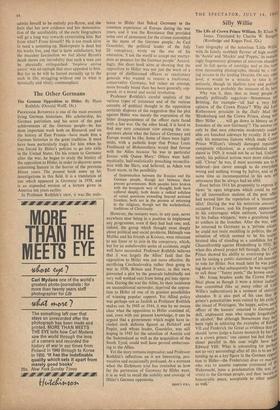The Other Germans
The German Opposition to Hitler. By Hans Rothfels. (Oswald Wolff, 18s.)
PROFESSOR ROTHFELS is one of the most eminent living German historians. His scholarship, his German patriotism and his sense of the past achievements of the German people—he has done important work both on Bismarck and on the history of East Prussia—have made him a German historian in the great tradition. It must have been particularly tragic for him when he was forced by Hitler's policies to go into exile in the United States. On his return to Germany after the war, he began to study the history of the opposition to Hitler, in order to discover some redeeming feature in the horror of the previous fifteen years. The present book sums up his investigations in this field. It is a translation of one which appeared in Germany in 1958, and is an expanded version of a lecture given in America ten years earlier.
In Professor Rothfels's view, it was the resis- tance to Hitler that linked Germany to the common experience of Europe during the war years, and it was the Resistance that provided some sort of atonement for the crimes committed in the name of the German people. As Carl Goerdeler, the political leader of the July 20 conspiracy, wrote on the eve of his execution, 'I ask the world to accept our martyr- dom as penance for the German people.' Accord- ingly, this short book aims at showing that the opposition to Hitler was not just the work of a group of disillusioned officers or reactionary generals who wanted to restore a traditional, conservative Germany, but rather an attempt, more broadly based than has been generally sup- posed, at a moral and social revolution.
Professor Rothfels's careful analysis of the various types of resistance and of the various currents of political thought in the opposition certainly disposes of the suggestion that the plot against Hitler was merely the expression of the bitter disappointment of the officer caste faced with a lost war. On the other hand, it is hard to find any very consistent view among the con- spirators about what the future of Germany and Europe would be like. Some of them were legiti- mists, with a pathetic hope that Prince Louis Ferdinand of Hohenzollern would find favour with the Allies because 'he was in particular favour with Queen Mary.' Others were half- mystically, half-realistically preaching reconcilia- tion with the Slays, and believed, as Adam von Trott wrote, in the possibility
of fraternisation between the Russian and the German people, though not between their present governments. Both peoples have broken with the bourgeois way of thought, both have suffered deeply, both desire a radical solution of social questions extending beyond national frontiers, both are in the process of returning to the religious, though not the ecclesiastical, traditions of Christianity.
However, the resisters were, in any case, never anywhere near being in a position to implement any programme, even if they had had one; and, indeed, the group which thought most deeply about political and social problems, Helmuth von Moltke and his friends at Kreisau, were reluctant to use force or to join in the conspiracy, which, but for an unbelievable series of accidents, might well have succeeded. Professor Rothfels believes that it was largely the Allies' fault that the opposition to Hitler was not more effective. By sacrificing Czechoslovakia rather than going to war in 1938, Britain and France, in this view, prevented a plot by the generals (admittedly not very well worked out) from being put into dpera- tion. During the war the Allies, by their insistence on unconditional surrender, deprived the opposi- tion to Hitler of one of its greatest possibilities of winning popular support. Yet Allied policy was perhaps not as foolish as Professor Rothfels makes out. In 1943 or 1944, it was by no means clear what the opposition to Hitler consisted of; and, even with our present knowledge, it can be argued that a government which might have in- cluded such dubious figures as Helldorf and Popitz, and whose leader, Goerdeler, was still hoping in 1943 for the retention of Austria and the Sudetenland as well as the acquisition of the South Tyrol, could well have proved embarrass- ing to the Allies.
Yet the story remains impressive; and Professor Rothfels's reflections on it are interesting, pro- vocative and occasionally profound. At a moment when the Eichmann trial has reminded us how far the perversion of Oermany by Hitler went, it is as well to recall the nobility and courage of Hitler's German opponents.
JAMES JOLL


































 Previous page
Previous page